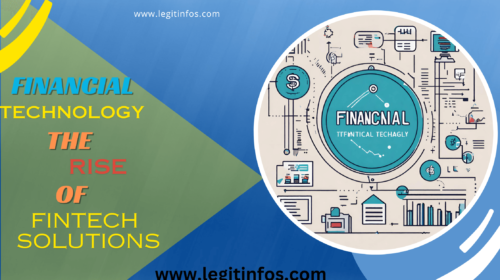In today’s world, financial technology, or fintech, is upgrading the way we perform transactions and manage our finances. From mobile payment apps to blockchain technology, fintech solutions are upgrading the future of financial services. As consumers continuously seek convenient, secure, and efficient ways to handle their money, the demand for fintech’s continues to increase.
In this Blogpost, we break into the world of financial technology to uncover the innovations that are leading the evolution of transactions. From contactless payments to robo-advisors, we look at how these advancements are streamlining processes and improving the overall user experience.
The Evolution of Financial Technology
Financial technology has come a long way since the introduction of the first ATMs and online banking. The evolution of fintech has been driven by advancements in digital world. Traditional banking and financial institutions have been forced to adapt to the changes by embracing digital transformation and integrating fintech solutions into their services.
The emergence of peer-to-peer (P2P) payment platforms and mobile wallets has further fastened the adoption of fintech’s among consumers. These innovations have not only made transactions more convenient but have also opened the way for financial inclusion.
The COVID-19 pandemic has also played a significant role in driving the evolution of fintech, as the need for contactless payments and remote financial management became more useful. This rapid acceleration of digital transformation in the financial industry has put out the importance to embracing innovative fintech solutions to meet the evolving needs of consumers and businesses.
Key Innovations in Financial Technology
- One key innovations that has improved transactions is the concept of contactless payments. Contactless payment methods, such as mobile wallets, have gained global acceptance due to their speed, convenience, and enhanced security features. The ability to make quick and secure transactions without the need for physical contact has transformed the way consumers interact with merchants and businesses, especially during the global pandemic.
- Another great innovation in fintech is the development of blockchain technology. Blockchain, the which is the technology behind cryptocurrencies like Bitcoin and Ethereum, has the potential to improve the way financial transactions are recorded and verified. It’s decentralized nature ensures the security and transparency of transactions, making it an attractive solution for various financial applications.
Impact of Financial Technology on Transactions
- The impact of financial technology on transactions has been unique, Changing the way individuals and businesses perform financial activities. The smooth integration of fintech solutions into our everyday transactions has resulted in increased efficiency, reduced costs, and improved accessibility to financial services.
- For businesses, fintech’s has opened up new opportunities to optimize payment processes and improve customer experiences. The ability to accept multiple payment methods, including contactless and mobile payments, has Increased the reach of businesses and improved customer satisfaction. Additionally, fintech solutions have enabled small and medium-sized enterprises (SMEs) to access alternative financing options.
- The impact of fintech on transactions also covers the global marketplace, where cross-border payments and remittances have been improved by innovative fintech solutions. This has not only promote faster and more cost-effective cross-border transactions but has also has empowered individuals and businesses to participate in the global economy with greater ease.
Challenges and Opportunities in Financial Technology
- While the advancements in financial technology have unlocked a lot of opportunities, they have also brought forth a set of challenges that must be addressed. One of the primary challenges facing the fintech industry is the need to balance innovation and regulation. As fintech continues to interrupt traditional financial services, regulatory bodies must stand to ensure consumer protection, data privacy, and financial stability.
- Cybersecurity and data privacy concerns also stand as a significant challenge in the fintech industry. With the volume of digital transactions and the storage of sensitive financial information, the industry faces constant threats from cyber attacks and data breaches. Fintech companies must invest in high level security measures and compliance protocols to safeguard customer data and eliminates the risks associated with cyber threats.
The Future of Financial Technology
The future of financial technology holds great potential for further innovation and interruption across the entire sector of financial services. Emerging technologies such as artificial intelligence, machine learning, and quantum computing are able to redefine the capabilities of fintech, enabling more sophisticated risk assessment, personalized financial advice. The integration of these advanced technologies will increase the development of intelligent financial solutions that solves the needs of consumers and businesses.
Decentralized finance (DeFi) are expected to improve traditional banking and investment models, offering greater accessibility and liquidity to a broader range of assets. Smart contracts, powered by blockchain technology, will automate complex financial agreements and enhance the execution of transactions, reducing reliance on intermediaries and enhancing transparency. Hence the rise of central bank digital currencies (CBDCs) and stablecoins will change the world of global payments..
Advantages of Using Financial Technology
- Provides greater convenience, easy accessibility and control over one’s financial activities.
- Digital platforms allows users to manage their bank accounts, monitor expenses and make easy transactions removing the need for physical visits to the bank.
- Improved efficiency and also saving of cost is another great advantage of using fintech solutions
Risks and Security Concerns in Financial Technology
- Cybersecurity threats, including data breaches, phishing attacks, and malware stands significant risks to financial data’s.
- Risk of scam technologies.
- financial technology.
Conclusion
In conclusion, the world of financial technology improving as time goes by, driven by innovation, consumer demand, and regulatory dynamics. The advent of contactless payments, blockchain technology, and other fintech innovations has changed the way transactions are conducted.
The journey of financial technology is an ongoing narrative improving constantly.



